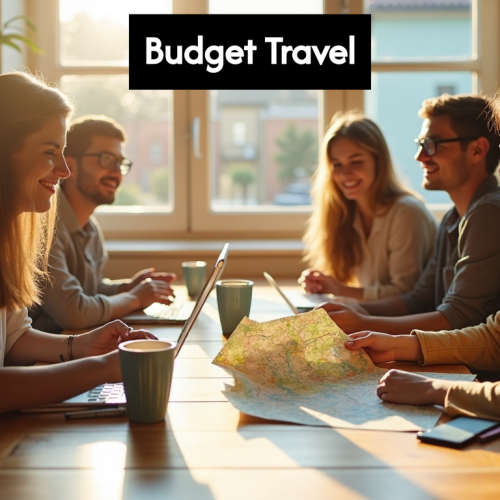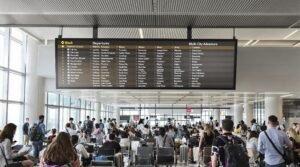
Planning a vacation for 2025 sounds exciting, but the real surprise is how much money travelers waste without even realizing it. Think about this. Booking during off-peak seasons can drop your trip costs by up to 40 percent. Most people believe you have to cut corners or sacrifice comfort to stick to a travel budget. Turns out, the smartest travelers focus on timing, flexibility, and a few clever tools to snag unforgettable trips at a fraction of the usual price.
Table of Contents
Quick Summary
| Takeaway | Explanation |
| Set a Realistic Travel Budget | Review your financial situation and allocate 5-10% of your annual income to travel, breaking down expenses into categories like transportation, accommodation, and daily living. |
| Utilize Timing and Flexibility for Bookings | Book international flights at least three months in advance and be open to midweek and shoulder season travel for better deals. |
| Embrace Alternative Activities | Explore free or low-cost urban experiences, outdoor adventures, and community engagement opportunities that offer enriching travel without overspending. |
How to Set a Realistic Travel Budget
Setting a realistic travel budget requires strategic planning and honest financial assessment. Your vacation dreams can become reality with careful preparation and smart financial choices. Budget travel planning is not about limiting your experiences but maximizing value and creating memorable adventures without breaking the bank.
Understanding Your Financial Parameters
Before diving into vacation planning, take a comprehensive look at your current financial situation. Start by reviewing your monthly income, existing savings, and discretionary spending. Learn more about smart travel savings strategies to ensure you make informed decisions.
Financial experts recommend allocating no more than 5-10% of your annual income to travel expenses. This percentage helps maintain financial stability while allowing you to enjoy memorable experiences. Break down your potential travel budget into key categories:
-
Transportation Costs: Flights, train tickets, car rentals
-
Accommodation Expenses: Hotels, hostels, vacation rentals
-
Daily Living Expenses: Food, local transportation, activities
-
Emergency Buffer: Unexpected costs and potential disruptions
Practical Budgeting Techniques
According to research from Bank Five, adding 15-20% to your initial travel budget estimate provides a crucial financial safety net. This extra padding covers often overlooked expenses like service fees, souvenirs, and spontaneous experiences.
Consider these practical budgeting strategies:
-
Open a dedicated travel savings account
-
Set up automatic monthly transfers
-
Track expenses using digital budgeting apps
-
Research destination-specific cost estimates
Smart Savings Strategies
Building your travel fund requires discipline and creativity. Wealth and Finance experts recommend gradual savings approaches. Start small by setting aside modest amounts consistently. Even $50 monthly can accumulate to significant travel funds over time.
Utilize travel rewards credit cards, compare prices across multiple platforms, and be flexible with travel dates. Off-peak seasons often provide substantial savings on accommodations and flights. Research destination-specific promotions and consider package deals that bundle transportation, lodging, and activities.
Remember, budget travel planning is about making informed choices. Prioritize experiences over luxury, seek authentic interactions, and remain adaptable. Your dream vacation is possible with strategic financial planning and a willingness to explore creative solutions.
Strategies to Find the Best Travel Deals
Finding exceptional travel deals requires a strategic approach and insider knowledge. Budget travel planning is not just about cutting costs but maximizing value and creating unforgettable experiences without draining your financial resources.
Timing Your Travel Bookings Strategically
Timing plays a crucial role in securing the best travel deals. According to Travel Age West research, flight prices in 2025 have dropped significantly across many global destinations. Specific international locations like Sydney and Hong Kong have seen price reductions of 23% and 16% respectively.
Discover smart flight booking techniques that can help you capitalize on these market trends. Travel professionals recommend specific booking windows:
-
International flights: Book at least three months in advance
-
Domestic flights: Reserve between two weeks and two months before departure
-
Off-peak travel periods: Seek midweek and shoulder season opportunities
Flexibility and Alternative Destination Strategies
Flexibility is your greatest asset in budget travel planning. Wealth and Finance experts emphasize the importance of considering alternative destinations and travel dates. For instance, choosing less popular tropical destinations can provide similar experiences at significantly reduced costs.
Consider these alternative approach strategies:
-
Explore emerging travel destinations with lower tourist traffic
-
Be open to midweek travel for better pricing
-
Research destinations with favorable exchange rates
-
Look for locations offering similar experiences at lower price points
Successful budget travel planning combines research, flexibility, and strategic timing. By understanding market trends, leveraging digital tools, and remaining adaptable, you can unlock incredible travel experiences without compromising your financial well-being. Remember, the best deals are not just about the lowest price but about finding the most value for your investment.
Essential Money-Saving Tips for Every Trip
Traveling on a budget requires strategic planning and smart financial decisions. Maximizing your travel experience while minimizing expenses is an art form that can transform your vacation from financially stressful to remarkably enjoyable.
Accommodation and Transportation Savings
Accommodation and transportation typically consume the largest portion of your travel budget. Learn more about budget-friendly travel strategies to make the most of your resources. Consider these cost-cutting approaches:
-
Accommodation Alternatives: Explore hostels, guesthouses, vacation rentals, and homestays
-
Transportation Hacks: Use public transit, rideshare services, and multi-day transportation passes
-
Loyalty Programs: Accumulate points through travel rewards credit cards and membership programs
-
Off-Peak Travel: Book during shoulder seasons for significant discounts
According to research from Blue to Green Travel, traveling during off-peak seasons can reduce overall trip costs by up to 40% while providing a more relaxed travel experience with fewer crowds.
Smart Spending Strategies
Managing daily expenses requires creativity and discipline. Break down your spending into essential and discretionary categories. Prioritize experiences over material purchases and seek out free or low-cost activities at your destination.
Effective money-saving techniques include:
-
Use local currency and avoid excessive foreign transaction fees
-
Carry a mix of payment methods (cash and cards)
-
Purchase local SIM cards for affordable communication
-
Cook some meals instead of dining out for every meal
-
Look for city passes that bundle attractions and transportation
Technology and Planning Advantages
Wealth and Finance experts recommend leveraging technology to uncover hidden savings. Mobile apps and online platforms offer real-time price comparisons, last-minute deals, and budget tracking tools.
Utilize digital resources to:
-
Compare prices across multiple booking platforms
-
Set up price alerts for flights and accommodations
-
Track daily expenses with budgeting apps
-
Access free walking tours and local event information
-
Find discounts through online communities and travel forums
Smart budget travelers understand that saving money is not about restricting experiences but about making informed choices. By combining strategic planning, technological tools, and a flexible approach, you can create memorable adventures without financial strain. Every dollar saved is an opportunity for another incredible moment in your travel journey.
Top Free and Low-Cost Activities Worldwide
Traveling on a budget does not mean sacrificing incredible experiences. Smart travelers understand that memorable moments often come without a hefty price tag. Explore budget-friendly travel experiences that can transform your journey without emptying your wallet.
Urban Exploration and Cultural Immersion
Major cities worldwide offer a treasure trove of free and low-cost activities that provide deep cultural insights. According to Money Lion research, numerous destinations provide enriching experiences at no cost.
Consider these budget-friendly urban adventures:
-
Free walking tours in historical districts
-
Public museums with complimentary admission days
-
Local community festivals and street performances
-
Public parks and botanical gardens
-
Historic neighborhood self-guided walking routes
-
Free cultural workshops and language exchange meetups
Outdoor and Nature-Based Experiences
Nature offers some of the most spectacular experiences without requiring significant financial investment. Hiking trails, public beaches, national parks, and community botanical gardens provide incredible opportunities for exploration and relaxation.
Budget travelers can enjoy:
-
Hiking and nature trail exploration
-
Beach and coastal walks
-
Public park picnics
-
Community sports events
-
Sunrise and sunset viewing spots
-
Bird watching and wildlife observation areas
Frequently Asked Questions
How can I set a realistic travel budget for 2025?
To set a realistic travel budget, review your financial situation, allocate 5-10% of your annual income for travel, and break down expenses into categories such as transportation, accommodation, and daily living expenses.
What are the best times to book flights for budget travel in 2025?
The best times to book flights are at least three months in advance for international flights and between two weeks and two months for domestic flights. Consider flying during midweek and in shoulder seasons for better deals.
What are some smart money-saving tips for traveling on a budget?
To save money while traveling, consider alternative accommodations like hostels or vacation rentals, use public transportation, track your expenses with budgeting apps, and prioritize free or low-cost activities at your destination.
How can I find affordable activities while traveling?
Look for free walking tours, public museums with free admission days, community festivals, and nature-based experiences like hiking. Engaging in local volunteer opportunities can also be a fantastic way to save money while immersing yourself in the culture. Check out our selected activities at https://www.tiqets.com/nl/?tq_campaign=4caa7907e04b49cc90f513fe2-560937&tq_click_id=4caa7907e04b49cc90f513fe2-560937&partner=travelpayouts.com
Make Every Dollar Count: Discover Real Budget Travel Solutions
Are you tired of travel plans that break your budget or force you to settle for less? This article reveals how most travelers lose money by missing out on perfect timing and smart booking. You want memorable trips without overspending. You need easy tools to lock in savings and real value on every vacation dollar.
Ready to experience stress-free trip planning? Take the next step and explore the smartest way to travel. Visit VacationSpotter.com to compare the cheapest flights, hotels, and transfers within seconds. With VacationSpotter.com, you can turn your travel budget plans into real adventures today. Stop postponing your dream vacation—start saving with one quick search now.







